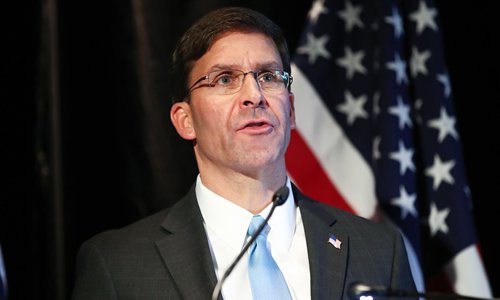Esper’s smear of China sounds paranoid
By Adam Garrie Source:Global Times Published: 2019/9/10 20:08:39

Mark Esper Photo: VCG
The US Defense Secretary Mark Esper recently delivered a speech that can only be described in one of two ways. Either it was an exercise in dishonesty or an exercise in paranoia.
Among other unsubstantiated accusations, Esper offered false claims about the China-proposed Belt and Road Initiative (BRI) in which he not only misrepresented BRI but described it in terms that are antithetical to reality.
While Esper claims that the BRI is somehow a Chinese plot to entrap partner countries in a system that will subject them to Chinese control, this has no relation to reality.
During the 19th century, the US became a leading world economy because of rapid industrial development. Unlike the major economies of Europe, the US stayed out of foreign wars in keeping with the practice of isolation although there were many armed conflicts that accompanied the expansion of US territory across North America.
Since 1978, China's reform and opening-up has resulted in the largest reduction of poverty in the shortest period of time ever witnessed in history.
During this period, China has not started a single war with any country, nor has China acted in a coercive manner against the interests of any foreign state.
China's method of enhancing prosperity has been a combination of intensive internal development and an openness to global trade and foreign direct investment. Because China seeks to trade with an ever-growing number of partners, engaging in war would be highly counter-productive. A nation destroyed is a nation incapable of doing commerce in a normal way and thus, a nation at war would be one less friendly economic partner for China.
China is likewise committed to promoting BRI on the basis of mutual respect for the sovereignty of all nations. Many leaders, including the current president of the traditional US ally the Philippines, have remarked that unlike when doing business with Western governments, when doing business with China, there are no political strings attached. Instead, transactions are conducted in a respectful and business-like atmosphere. This has been a point of attraction surrounding BRI in Asia, Africa and Latin America.
But beyond facilitating normal avenues of trade, BRI is also about investing capital and expertise into developing countries that for decades have been ignored by wealthy Western countries.
Where Western financers have traditionally seen only risk, China sees win-win opportunities by looking to a long-term future.
Moreover, because BRI stresses bespoke economic development in all partner nations, each country participating in BRI will be able to produce according to its strengths whilst importing goods that were previously unavailable.
China is a country defined by commerce, innovation, high-quality development, trade and a peaceful drive to build a moderately prosperous society in all respects. The subjugation of other nations is both financially and politically incompatible with such goals and the evidence bears this out fully.
It should be noted that when some US politicians weave tall tales about the Chinese government using telecommunications products made in China as a means of spying on foreign countries, such claims are not backed by any evidence. The entire premise is based on an irrational fear that China could use telecom equipment in such a way even though logically, this would ultimately be bad for business. Such an argument would be as ridiculous as saying that China could deploy a nuclear weapon, but no serious person on the planet believes that such a thing will happen.
It is not clear why people like Esper feel inclined to slander China in this way. America often preaches the virtues of a free and open global market but then takes steps and makes statements which run contrary to the rules and spirit of a rules-based economic system. The doubly sad reality is that if the US accepted economic openness, free trade and commerce divorced from politics, a win-win world order where the US and China could increase trade and therefore increase trust could develop.
If the 21st century is to be more peaceful than its predecessor, the way to achieve this is by replacing geopolitical intrigue with a transparent rules-based economic order in which countries can increase trade.
Esper's words belong to another century whilst the foundations of BRI are helping to shape a more cooperative 21st century in which countries trade together rather than one in which countries invade each other.
Those who reject the spirit of openness will only be inflicting damage on themselves whilst causing harm to other nations that will suffer as an inadvertent consequence of such foolish, self-destructive and outdated policies.
Since 1978, the US has invaded multiple countries whilst its people have received nothing in return other than a mountain of public debt that they will eventually have to pay for. China on the other hand has embraced the notion of peace through prosperity as the country continues to pursue further reform and opening-up. If anything, people in America should question the war-hungry attitudes of men like Esper as it is these attitudes which have resulted in economic hardship for those in both the West and East.
The author is director of Eurasia Future, an independent news platform. opinion@globaltimes.com.cn
Posted in: VIEWPOINT,CHINA-US